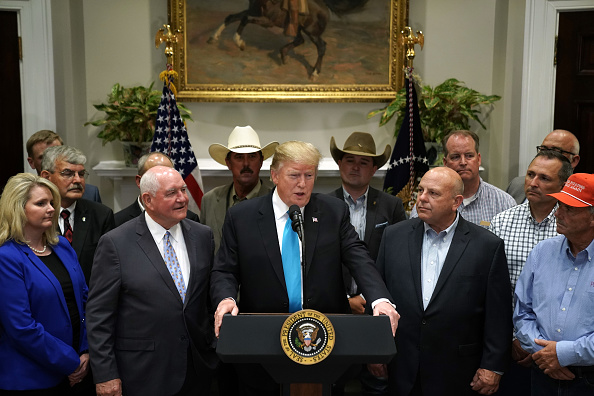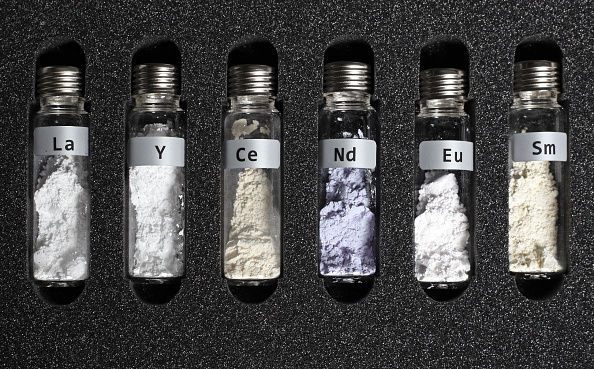
 Farm Aid or Band Aid?
Farm Aid or Band Aid?Originally billed as "short-term pain," the US-China trade war seems to be unfolding into long-term troubles.
Speaking at the White House on Thursday, President Trump announced a hefty $16 billion aid package for farmers impacted by the prolonged US-China trade war, $14.5 billion of which will be distributed via cash payment.
Now entering its 10th month, the trade war between the world's two largest economies has had an outsized impact on American farmers, who are losing business due to China's retaliatory agriculture tariffs and extreme weather conditions. Roughly 60 percent of US soybean exports once ended up in China, but without Chinese demand, the Department of Agriculture predicts that the country's soybean surplus will reach 895 million bushels by September, more than double what it was in 2018.
Following last year's $12 billion package of emergency farm aid, the Trump administration's second aid package is once again intended to "help keep our cherished farms thriving and make clear that no country has veto on America's economic and national security," Trump said at a press conference Thursday. Farmers donned in cowboy hats stood by supportively as the president made his comments.
As the 2020 presidential election looms overhead, analysts see Trump's latest round of farm aid as a move to secure support from farmers and lower-income voters, the core of his voting base. Critics are calling the move a "band aid," while others believe that the President is "leveraging his tariffs to blackmail China into following his way," according to James Nolt in his latest article for China-US Focus.
While Trump prepares the country for what seems to be an even lengthier trade dispute, President Xi Jinping is doing the same, calling on the Chinese people to prepare for a "new long march," echoing the country's shared memory of prolonged war.
Some analysts believe that this level of competition may be the "new normal," including Lawrence Lau, author of "The China-U.S. Trade War and Future Economic Relations."
The first round of cash payments in President Trump's aid package is expected to reach farmers as early as late July. Until then, onlookers on both sides of the Pacific will have to wait until the next round of US-China trade negotiations, which are scheduled to occur in over a month.
 China's Iron Throne
China's Iron ThroneIn addition to hardening his tone on the US-China trade dispute, President Xi Jinping on Monday made a visit to a rare earths processing facility, sparking debate on whether China would leverage its dominance in the rare earths sector against Trump's tariffs.
Concerns are well-founded: with his top trade negotiator Liu He in tow, Xi's tour of the processing facility on Monday was widely broadcast over state-run news, with some state-owned outlets calling US dependence on Chinese rare earth elements an "ace in China's hand."
"The message was, this is a supply chain and we control your supply chain," said Clint Cox, president of the Anchor House, a rare-earths consulting firm in Evanston, Illinois.
China has an iron grip over the rare earths industry and supplies the US with about 80% of its rare earths imports. Known as the "vitamins in modern technology," uses for rare earths range from brightening smartphone display screens to controlling guided missiles. While rare earths fuel today's global supply chain, few countries actually tolerate refining the material because the process is extremely polluting and sometimes produces radioactive material.
Some analysts see Xi's highly publicized visit as a sign that China will use its dominance to target US reliance on Chinese rare earths. Notably, Trump's latest round of tariffs spared Chinese rare earths imports, adding to that speculation. Others aren't so sure, saying that such a move would not only undermine China's domestic industry but also give Washington one more reason to convince to the international community to shift production out of China and to US allies.
 Tying the Knot
Tying the KnotIn other news, Taiwan made history this week by becoming the first place in Asia to register same-sex marriages. The bill represents a landmark victory for LGBTQ rights in the region, and on Friday thousands of people gathered in the streets of Taiwan to celebrate the first couples to legally tie the knot.
The move was not without conservative opposition, however, and many still remember the outcome of last November's referendum vote which decided not to grant full rights to same-sex couples. Even so, the Democratic Progressive Party was able to push through a bill which grants same-sex couples many marriage benefits enjoyed by heterosexual couples, including child custody, tax and insurance benefits.
Surprisingly to some outside observers, no opposition emerged from Beijing. In fact, China's leading state-run news outlet praised the news. "Local lawmakers in Taiwan, China, have legalized same-sex marriage in a first for Asia," the People's Daily tweeted on May 18. Taiwan's foreign ministry shot back in another tweet, rejecting the insinuation that Beijing was involved in the island's milestone ruling.
As historic as the decision is, there are still limitations on the rights enjoyed by same-sex couples in Taiwan, including limited adoption and child custody rights. Chi Chia-wei, a Taiwanese gay rights activist, told the New York Times, "Progress is good. More progress is even better."
Prepared by China-US Focus editorial teams in Hong Kong and New York, this weekly newsletter offers you snap shots of latest trends and developments emerging from China every week, while adding a dose of historical perspective.
- 2019-05-17 Risky Business
- 2019-05-10 Two Steps Forward, Two Steps Back
- 2019-05-03 The Final Laps?
- 2019-04-26 The Great Turbine Caper?
- 2019-04-19 Sowing Seeds of Tension
- 2019-04-12 Slow or Steady?
- 2019-04-05 The Last Mile is The Hardest
- 2019-03-29 From Negotiation to (Smart) Competition
- 2019-03-23 Xi Hits the Road
- 2019-03-16 Proceeding With Caution
- 2019-03-08 Reading the Tea Leaves
- 2019-03-01 The Art of No Deal
- 2019-02-23 The Devil is in the Details
- 2019-02-16 Trade Talks, Round 3: Waiting for Trump-Xi?
- 2019-02-08 Welcoming the Pig
- 2019-02-02 The Final Countdown: One Month Until Trade Talks Deadline
- 2019-01-26 How Slow Will it Go?
- 2019-01-18 Countdown to Trump-Kim: Round Two
- 2019-01-11 Kim Jong-un Visits Beijing
- 2019-01-04 Cross-strait tensions mount on anniversary